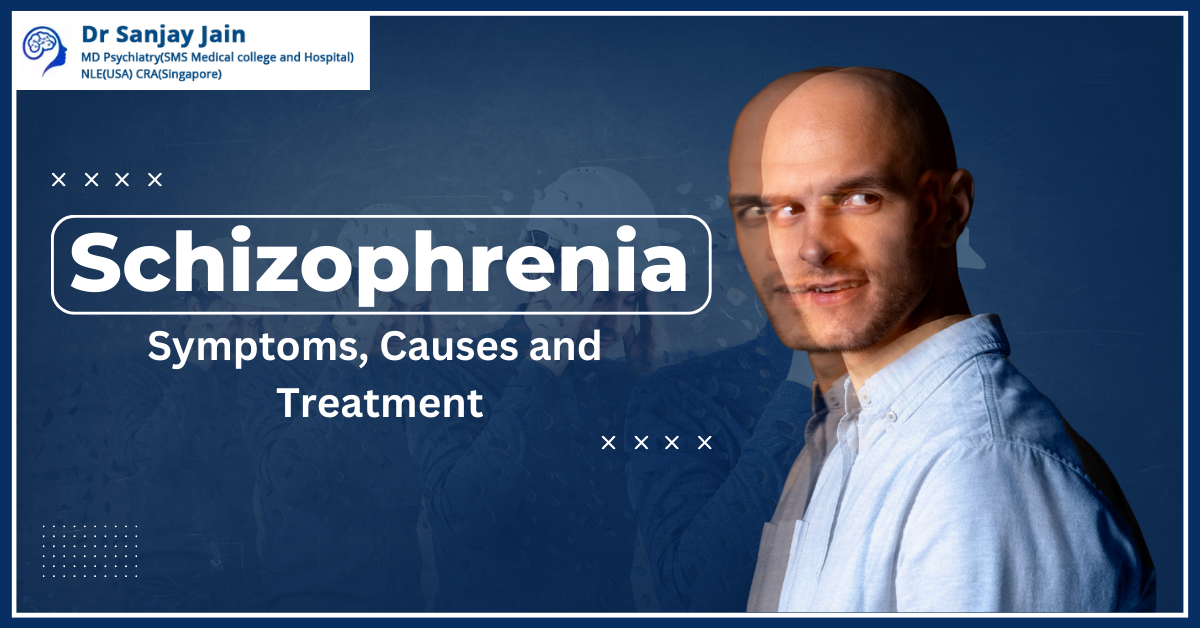
Schizophrenia: Symptoms, Causes and Treatment
Schizophrenia is a chronic mental health condition where people experience distortions (disconnections) from reality and is often caused by environmental, genetic, and biological factors. In this, affected individuals interpret reality abnormally, resulting in combinations of delusions, hallucinations, and disordered thinking. It affects normal daily working and causes disabling mental situations.
According to the Schizophrenia in India report by the National Institutes of Health, it affects only 3/1000 individuals. It is common in men and women in their early 20s or late teens. Men show signs of schizophrenia early, compared to women, who tend to show the signs in their late 30s or 20s.
People with schizophrenia, therefore, require lifelong psychological therapy and medical treatment, even after the symptoms are subsided, which helps manage the condition and improve the quality of affected individual lives.
Schizophrenia: Overview
You’re on the right page if you want to know more about this rare mental disorder.
In this blog, we will be exploring the in-depth details of Schizophrenia (in simple terms) from our expert psychiatrist and psychologist in Jaipur, Dr. Sanjay Jain, holding 13+ years of experience in the field.
What is Schizophrenia?
To begin with, let’s start with a simple clarification about schizophrenia and multi or split personality. Due to the changed behaviors of affected individuals, people often relate it with split or multi-personality disorder, which is false, as both these disorders are different.
Schizophrenia involves psychotic symptoms, a condition where emotions and thoughts are so affected that connection with reality is lost. When affected by this mental illness, people cannot distinguish what is real and imaginative and, therefore, lose connection with reality. For them, the world is a jumble of confusing images, thoughts and sounds, resulting in personality change, also known as a psychotic episode.
The disorder’s early symptoms usually start at an early age-
- Between the age of 15-25 in men
- Between the age of 25-35 in women.
- Before the age of 18 in children (rarest case).
Schizophrenia affects the personal mental and physical well-being, disrupts the normal brain works, interferes with thinking ability and memory, working of senses, and more. Since the brain working is improper in Schizophrenia, it causes a struggle to manage day-to-day life activities, often affects relationships (social, personal, professional and romantic), makes it difficult to organise thoughts, and increases the risk of injuries.
Symptoms of Schizophrenia
1. Early Symptoms

Early symptoms refer to actions reflected in the early 20s or teenage years. Early symptoms of Schizophrenia include –
- Changing social or friends group,
- Agitation or irritability,
- Vague suspiciousness,
- Sleep problems,
- Odd ideas,
- Feeling different from normal people,
- Isolating from friends or family,
- Change in concentration or focus,
- Poor academic performance and difficulties with schoolwork
- Lack of motivation,
- Temper flares.
Since these are the earliest signs, they are often overlooked because most symptoms resemble typical adolescent behaviour.
2. Positive Symptoms
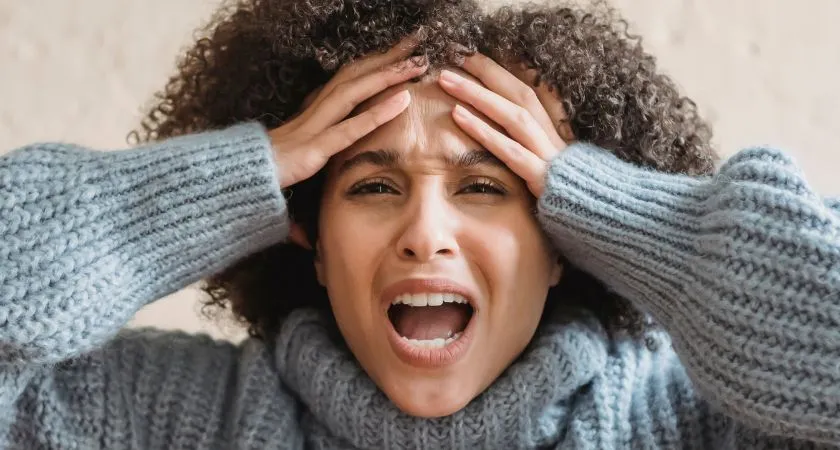
When schizophrenia symptoms are more categorised, they are further divided into positive, negative and cognitive symptoms.
Positive symptoms refer to the added actions or thoughts to typical individual behaviour (according to age). These symptoms include-
Delusions –
Delusions often refer to mixed, false or strange beliefs that are not reality-based. In this, the person often refuses to give up after even showing or being confronted with the facts of delusions.
They often believe that –
- They are being pursued by something or someone.
- Someone is remotely trying to control their actions and thoughts.
- They believe they are immortal, famous personalities with extreme abilities and powers.
Hallucinations –
Hallucinations are scenarios created in mind, and these sensations are often not real. The most common hallucination is hearing strange voices that comment on individuals’ behaviour, insulting or giving commands. The second most common hallucination is seeing things that aren’t physically there, smelling odours, feeling a funny, strange taste in your mouth, or even skin sensations.
Paranoia –
In this situation, the person usually does not trust others and believes they are being persecuted or followed.
Catatonia –
Catatonia is when a person often stops speaking or moving, staying in a single position longer.
3. Negative Symptoms

Negative symptoms are when a person usually lacks something which is a part of normal behaviour. These symptoms include –
- Strange emotional responses to situations,
- Social isolation,
- Difficulty following through on plans,
- Lack of expressions or emotions,
- Lack of motivation or life excitement,
- Reduction in speaking,
- Difficulty in experiencing pleasure,
- Difficulty in completing everyday activities.
However, it’s important to note that negative does not mean bad symptoms. It just marks the absence of normal behaviour.
4. Cognitive Symptoms
Cognitive symptoms indicate that the affected individual has trouble with mental or cognitive functions. These include –
- Disorganised speech or thinking when a person talks in made-up phrases or changes topics frequently amid conversations.
- Difficulty in remembering things
- Trouble paying attention or focusing
- Poor decision-making power or executive functioning powers.
- Problems in memorising or learning things and using them in practical life.
Most of the people suffering from schizophrenia have difficulty realising that they are not well. Therefore, it is not easy to convince them of the treatment or medication, as they might believe medications could hurt them or be feared for the side effects of the treatment.
5 Causes of Schizophrenia
1. Genetics
There are some chances of developing schizophrenia if there is a history of the treatment in the family, as there is a greater likelihood that the genetics may be passed from parents to the children. However, the chances are very low when the family has no history or relatability.
2. Brain Chemistry and Abnormality
People suffering from schizophrenia cannot regulate or manage the brain chemicals called neurotransmitters, which are further responsible for controlling nerve cells circuits or pathways, affecting their behaviour and thinking.
Brain abnormality, including abnormal brain structure, also increases the likelihood of the problem.
3. Environmental Factors
Viral infections, trauma during birth, trauma, and malnutrition before birth may also increase the chances of schizophrenia.
4. Stressful Life Events
Highly stressful life events, like violence or trauma, may also trigger the mental disorder, as it often surfaces when the body has physical or hormonal changes, usually in the young adult or teen years.
5. Drug Use
Increased exposure to toxins like marijuana, LSD, speed, or other drugs trigger schizophrenia in individuals whose genes are more likely to develop the disorder. Therefore, genetic factors and life experience may increase the chances.
Schizophrenia Treatments & Self Care
Starting with the diagnosis of Schizophrenia, there is not even a single test that helps diagnose the disorder and its symptoms. Only a complete session of psychiatric treatments with experts can help identify the issue in individuals.
When planning for the visit of psychiatrist treatment, be prepared with the list of-
- Individual’s medical history,
- Family medical history,
- Mental health.
Based on these reports, doctors may conduct a physical exam, imaging tests like MRI or CT scan and blood work for the diagnosis. If an individual has hallucinations, disorganised speech or delusions, they are diagnosed with the disorder.
However, once diagnosed, Schizophrenia requires regular medical treatment to either manage or reduce the severity of the treatment. There is no particular or standard cure for schizophrenia; treatment or sessional sittings with mental health professionals can help with the treatment.
A possible yet proven list of treatments that can help overcome schizophrenia symptoms are –
1. Family Support And Education
Family and friends’ support play a critical role in managing or lowering schizophrenia symptoms, as it helps with the feeling of inclusion and lowers stress levels, helping with the proper functioning of the brain. Educational programs for family members are available to help with the support.
2. Vocational Rehabilitation
Vocational rehabilitation can help develop skills required to keep up the daily working of professional and personal lives, making it easier to return to work and maintain a regular job.
3. Psychiatrist Advice
Psychological intervention is the best treatment option for Schizophrenia, which includes individual therapy that helps cope with illness and stress. However, expert psychiatrist assistance is required for the best treatment, as it’s all the mind game. An experienced expert can only figure out the best ways to deal with a patient’s condition and ensure the inclusion and importance of individuals in society.
If someone around you suffers from Schizophrenia, Dr. Sanjay Jain in Jaipur, a highly qualified doctor for psychiatrist procedures, will help you with the best treatments. He has been serving patients with mental health disorders for 13 years. With 4.9 star Google ratings, Dr. Sanjay Jain is the most recommended psychiatrist in and around Jaipur. Click here
Worry no more, as you’re not alone in this treatment. It’s a normal part of life and will pass on easily with the help of expert assistance. Connect with the doctor now to know more.
Conclusion
Schizophrenia can be a disheartening and frightening condition for the individual suffering from it or for their loved ones. However, facts claiming that it cannot be cured are completely false. Reports suggest that every 3 out of 5 people suffering from Schizophrenia can recover from the issue if provided with the best psychiatrist treatment.
To start being on the road to improvement, start with learning about the individual’s condition, go through the risk factors, and follow the doctor’s treatment plan. The best expert who specialises in mental health conditions like schizophrenia offers the best treatments without making the affected individual feel embarrassed, judged or ashamed. Lastly, early diagnosis of Schizophrenia will make a big difference, helping with easy and fast recovery and management.
FAQs

Dr. Sanjay Jain is a highly qualified and one of the best psychiatrist in Jaipur, India, with over 13 years of experience. He earned his medical degrees from SMS Medical College and Hospital. Dr. Jain is known for his global research work on mental health. He believes in not just using medicine but also educating and working with patients to find the best treatment plan. He was recognized as one of Jaipur’s top psychiatrists in 2020 by threebestrated.com, a trusted US-based ranking company.
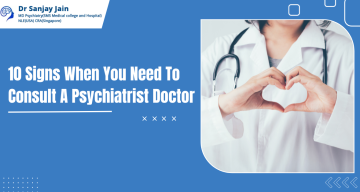
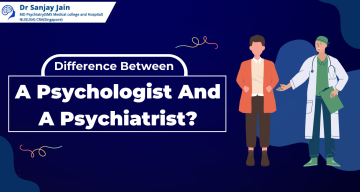
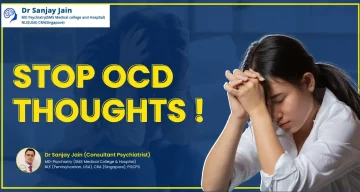
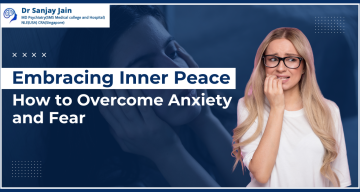
Leave a comment